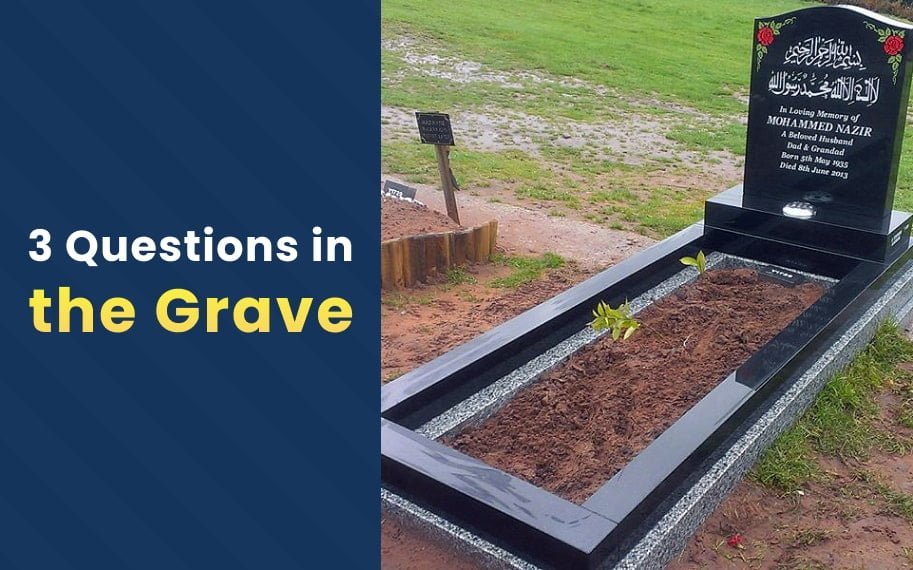
Death is an inevitable reality that every human being will face. In Islam, the journey doesn’t end with death; rather, it transitions to the afterlife, which holds profound significance. One of the pivotal moments in this journey is the questioning in the grave. According to Islamic tradition, the angels will ask every person 3 critical questions. Understanding these questions and preparing for them is essential for every believer. In this blog, we delve into the significance of these questions and how one can spiritually prepare for them.
Table of Contents
The 3 Questions
The questions posed in the grave are fundamental to one’s afterlife. They serve as a reckoning of a person’s faith, actions, and intentions during their worldly life. The three questions are as follows:
- Who is your Lord?
- What is your religion?
- Who is your prophet?
These questions may seem straightforward, but their implications are profound. They aim to gauge the individual’s faith, sincerity, and adherence to the principles of Islam.
Significance of the Questions
1. Who is your Lord?
This question directs the focus to the essence of faith: belief in the oneness of Allah. It assesses whether the individual recognized and worshipped the true Creator during their lifetime.

2. What is your religion?
Here, the emphasis is on one’s commitment to Islam as a complete way of life. It evaluates whether the person adhered to the teachings of Islam in all aspects of their existence.

3. Who is your prophet?
This question underscores the importance of following the guidance of the Prophet Muhammad (peace be upon him) as the final messenger of Allah. It examines whether the individual followed his teachings and example.

Preparing for the Questions
Preparing for these questions requires a holistic approach encompassing faith, actions, and intentions. Here are some ways to spiritually prepare:
- Strengthening Faith: Cultivate a deep and unwavering belief in the oneness of Allah. Engage in regular acts of worship such as prayer, supplication, and remembrance of Allah to strengthen your connection with Him.
- Living by Islamic Principles: Embrace Islam not only as a religion but as a comprehensive way of life. Strive to uphold the teachings of Islam in your interactions, transactions, and daily conduct.
- Following the Prophet’s Example: Study the life and teachings of Prophet Muhammad (peace be upon him) to understand his exemplary character and emulate his behavior in your own life.
- Sincere Repentance and Seeking Forgiveness: Continuously reflect on your actions and seek forgiveness for any shortcomings or sins. Repentance should be sincere, accompanied by a firm intention to rectify mistakes and strive for improvement.
- Charity and Good Deeds: Engage in acts of charity, kindness, and service to others. These deeds not only benefit those in need but also serve as a means of earning blessings and purification for the soul.
- Dua (Supplication): Regularly supplicate to Allah for guidance, forgiveness, and protection. Seek His mercy and grace in preparing for the challenges of the grave and the afterlife.
Conclusion
The questions in the grave serve as a reminder of the accountability each individual will face in the afterlife. By understanding the significance of these questions and actively preparing for them, believers can strive to lead a life of faith, righteousness, and obedience to Allah and His messenger. May Allah grant us the wisdom and strength to face these questions confidently and sincerely on the Day of Judgment.
FAQs
What 3 questions will be asked in the grave?
Who is your Lord, what is your religion, and who is your Prophet?
Who are the angels Munkar and Nakir?
Munkar and Nakīr, in Islāmic eschatology, are two angels who test the faith of the dead in their tombs.
What significance do the 3 questions in the grave hold in Islam?
The 3 questions in the grave hold immense significance in Islam as they serve as a means of accountability in the Hereafter. They determine the fate of individuals based on their beliefs and deeds in their earthly lives. Answering them correctly reflects one’s faith and adherence to Islamic teachings, leading to either reward or punishment in the Hereafter.
Are these questions mentioned explicitly in the Quran or Hadith?
While the exact wording of the questions may not be explicitly mentioned in the Quran, the concept of questioning in the grave is supported by various authentic Hadiths (sayings of Prophet Muhammad, peace be upon him). Scholars have derived the questions from these Hadiths and provided interpretations based on Islamic teachings.
What if someone struggles to answer the questions in the grave?
It is believed that a person’s ability to answer these questions in the grave is based on their faith and deeds in their earthly life. Those who sincerely lived by Islamic teachings and strove to fulfill their religious obligations are expected to find ease in answering these questions. However, for those who may struggle, seeking forgiveness, repentance, and performing righteous deeds during their lifetime are encouraged as a means of preparation for the questioning in the grave.
How can one strengthen their belief in Tawheed (oneness of Allah)?
Strengthening belief in Tawheed requires deepening one’s understanding of Allah’s attributes, His oneness, and His role as the Creator and Sustainer of the universe. Engaging in acts of worship such as Salah (prayer), recitation of Quranic verses, and reflecting on the signs of Allah’s creation can help reinforce this belief. Additionally, seeking knowledge from authentic sources and surrounding oneself with a supportive Muslim community can aid in strengthening belief in Tawheed.
What are some practical steps to adhere to Islamic teachings in daily life?
Adhering to Islamic teachings involves incorporating Islamic principles into various aspects of daily life. This includes performing acts of worship such as Salah, fasting, giving charity, and upholding moral values such as honesty, kindness, and justice. Regularly seeking knowledge from authentic sources, attending religious gatherings, and striving to implement Islamic teachings in interactions with others are practical steps to adhere to Islamic teachings in daily life.
Why is it essential to study the life of Prophet Muhammad (PBUH) in preparing for the questioning in the grave?
Studying the life and teachings of Prophet Muhammad (peace be upon him) is essential for Muslims as he serves as the role model and the final messenger sent by Allah. Learning from his example guides how to embody the principles of Islam in daily life. By studying his life, understanding his teachings, and implementing the Sunnah (traditions) in various aspects of life, one can strengthen one’s connection with him and affirm his prophethood, which is crucial in preparing for the questioning in the grave.
How can one maintain consistency in preparing for the questions in the grave?
Consistency in preparation requires sincerity and commitment to one’s faith. Establishing regular habits of worship, such as performing Salah (prayer) on time, reciting the Quran regularly, engaging in dhikr (remembrance of Allah), and seeking knowledge from authentic sources, are essential in maintaining consistency in spiritual growth and preparation for the Hereafter. Additionally, surrounding oneself with a supportive Muslim community, engaging in self-reflection, and seeking forgiveness for shortcomings can further aid in maintaining consistency in preparing for the questioning in the grave.
Read Also
10 Companions Who Were Promised Paradise
Shab e Miraj – All You Need to Know
Zakat in Islam – All You Need to Know
Zamzam Water – History, Importance & Benefits
Social Media & Its Impact on Muslim Youth

